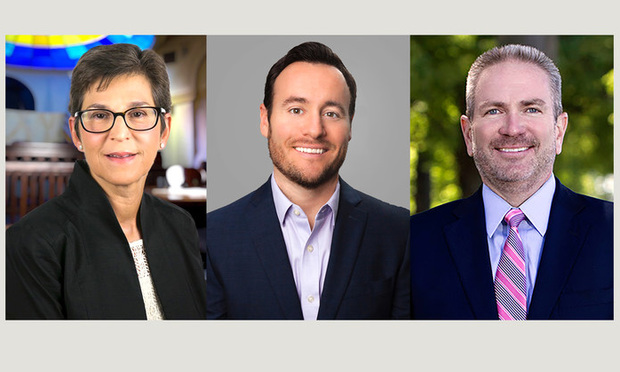The Big Fail Part III: Hiring—Then Firing—as Bar Pass Rates Sink
The recruiting advantages held by Big Law mean that record-low bar pass rates are affecting small firms and public sector organizations the most.
April 28, 2019 at 04:00 PM
7 minute read
 Molly Wescott, Jonathan Littrell and Brian Jackson.
Molly Wescott, Jonathan Littrell and Brian Jackson.
It's the little guy taking the biggest hit from record-low bar pass rates.
Because of Big Law's tendency to hire from elite law schools that have for the most part maintained steady bar-pass rates, those firms have largely escaped the impact of the growing percentage of exam failures over the past five years.
But the reality is different for smaller firms and public sector employers that hire from a wider pool of law schools and can little afford to hold jobs open for graduates who flunk the bar.
Some 29,045 people failed the bar exam in 2017, which is 41 percent of those who sat for the exam, according to the National Conference of Bar Examiners. (Fewer than a third of bar takers failed in 2013.) And while it's uncertain how many of them were headed into Big Law, it is clear that those jobs represent a narrow slice of entry-level legal employment. Just 13 percent of 2017 J.D. graduates went to law firms of 500 or more lawyers, data from the National Association for Law Placement shows.
By contrast, 24 percent of 2017 graduates went into jobs at firms of 50 or fewer attorneys—the employers hit hardest by declining bar pass rates. As a result, lower pass rates are creating hiring headaches for the smaller employers that can least afford additional recruiting challenges.
Read earlier installments of Law.com's The Big Fail series that address the reasons for record-low bar pass rates and how law schools are trying to fix the problem.
“We know enough about what has happened to the bar pass rate across all jurisdictions to know that it's having some impact on employers,” said National Association for Law Placement executive director James Leipold, who cautioned that no research has been conducted to gauge the extent of that impact.
But anecdotal evidence indicates that some legal employers, both in and out of Big Law, have retooled their recruiting efforts and bar exam policies to account for the chance that a new hire won't make the cut.
Jonathan Littrell, managing partner of Raines Feldman, a 50-lawyer firm based in Los Angeles, said his firm has formalized its approach to hiring junior lawyers partly because of trends in California—a state that has seen a 14-percentage point drop in its first-time pass rate over the past five years.
While his firm didn't previously have much concern about the issue, he explained, it has recently  crafted a policy for dealing with recent law school graduates who come to the firm—even from top schools—but end up failing the exam.
crafted a policy for dealing with recent law school graduates who come to the firm—even from top schools—but end up failing the exam.
“We've actually had to come up with a policy, because we've had it pop up more often than in the past,” he said.
At Raines Feldman, he said, recent graduates typically start at the firm as law clerks until they receive their bar exam results. If they don't pass on the first go, the firm will allow them to take an additional period of leave—without pay—to study for and retake the exam. Raines Feldman will cut ties with an aspiring lawyer, however, if he or she fails a second time.
Part of the thinking behind that policy stems from the costs a smaller private firm assumes when it hires a recent law school graduate, Littrell said. As a general rule of thumb, he added, it takes new associates two or three years of training and mentorship before they start adding value to the firm's bottom line.
For a smaller firm, two or three years of an associate's salary alone can be a hefty investment, said Brian Jackson, chairman of McNees Wallace & Nurick, a central Pennsylvania-based firm with more than 120 lawyers. If an incoming hire doesn't pass the bar until a second or later attempt, it stretches even further the amount of time until the person becomes a net gain for a firm's bottom line.
Jackson said that at McNees Wallace it has been more than a decade since an incoming associate failed the bar exam. He attributes that record to the firm's position as one of the largest in the region, which means it can recruit from the tops of law school classes.
Jackson recognizes that his firm is in an advantageous position compared with some of its smaller counterparts when a new hire fails to pass the bar exam.
“When you've got a hundred-plus attorneys you can absorb that loss of productivity.”
Typically, incoming hires at large firms have two or maybe three chances to pass the bar exam before they're shown the door, according to Janet Stanton, partner at the legal consultancy Adam Smith Esq. After an initial failure, any leave that the aspiring lawyer takes from a Big Law firm would likely be unpaid.
Leipold said that some large law firms are investing more heavily in bar preparation courses for incoming associates—both those taking the exam for the first time and retakers—after experiencing an uptick in new recruits failing. Firms spend a significant amount of money recruiting and training new associates, thus they have a vested interest in their bar exam success, he added.
While large firms and some smaller ones may be able hang on to law grads until they pass the bar and get up to speed, that leeway tends to be absent at many public interest or public sector legal employers, said Molly Wescott, assistant dean for career and professional development at the University of San Diego School of Law.
“If they're hiring someone, they need to be ready to go into court,” Wescott said of small public sector and public interest employers. She added, “They want those people to be representing the client. Their resources are more limited.”
About 18 percent of 2017 law graduates ended up in government or public sector law jobs after graduation, with another 11 percent in judicial clerkships. Many government and public interest employers, along with small firms, simply wait until candidates have already passed the bar to consider hiring them to avoid the potential problem of bar failure altogether, Leipold noted.
In fact, the increase in people failing the bar may actually be pushing down the overall entry-level legal employment rate, which is calculated as of 10 months after graduation, because a higher percentage of recent law graduates aren't in the running for those jobs until they pass, Leipold said.
“Rather than small and medium-sized and public sector employees having to deal with people they have hired and then fail the bar, they just don't hire them until they get the bar license,” he said. “So I do think some of the depressed employment rate is a result of this depressed bar passage rate.”
Additional reporting by Karen Sloan. Data collection by Ben Hancock. Charts by Dave Palmer.
This content has been archived. It is available through our partners, LexisNexis® and Bloomberg Law.
To view this content, please continue to their sites.
Not a Lexis Subscriber?
Subscribe Now
Not a Bloomberg Law Subscriber?
Subscribe Now
NOT FOR REPRINT
© 2025 ALM Global, LLC, All Rights Reserved. Request academic re-use from www.copyright.com. All other uses, submit a request to [email protected]. For more information visit Asset & Logo Licensing.
You Might Like
View All

'A Death Sentence for TikTok'?: Litigators and Experts Weigh Impact of Potential Ban on Creators and Data Privacy

Skadden and Steptoe, Defending Amex GBT, Blasts Biden DOJ's Antitrust Lawsuit Over Merger Proposal
4 minute read
Amex Latest Target as Regulators Scrutinize Whether Credit Card Issuers Deliver on Rewards Promises
Trending Stories
- 1Avantia Publicly Announces Agentic AI Platform Ava
- 2Shifting Sands: May a Court Properly Order the Sale of the Marital Residence During a Divorce’s Pendency?
- 3Joint Custody Awards in New York – The Current Rule
- 4Paul Hastings, Recruiting From Davis Polk, Adds Capital Markets Attorney
- 5Chancery: Common Stock Worthless in 'Jacobson v. Akademos' and Transaction Was Entirely Fair
Who Got The Work
J. Brugh Lower of Gibbons has entered an appearance for industrial equipment supplier Devco Corporation in a pending trademark infringement lawsuit. The suit, accusing the defendant of selling knock-off Graco products, was filed Dec. 18 in New Jersey District Court by Rivkin Radler on behalf of Graco Inc. and Graco Minnesota. The case, assigned to U.S. District Judge Zahid N. Quraishi, is 3:24-cv-11294, Graco Inc. et al v. Devco Corporation.
Who Got The Work
Rebecca Maller-Stein and Kent A. Yalowitz of Arnold & Porter Kaye Scholer have entered their appearances for Hanaco Venture Capital and its executives, Lior Prosor and David Frankel, in a pending securities lawsuit. The action, filed on Dec. 24 in New York Southern District Court by Zell, Aron & Co. on behalf of Goldeneye Advisors, accuses the defendants of negligently and fraudulently managing the plaintiff's $1 million investment. The case, assigned to U.S. District Judge Vernon S. Broderick, is 1:24-cv-09918, Goldeneye Advisors, LLC v. Hanaco Venture Capital, Ltd. et al.
Who Got The Work
Attorneys from A&O Shearman has stepped in as defense counsel for Toronto-Dominion Bank and other defendants in a pending securities class action. The suit, filed Dec. 11 in New York Southern District Court by Bleichmar Fonti & Auld, accuses the defendants of concealing the bank's 'pervasive' deficiencies in regards to its compliance with the Bank Secrecy Act and the quality of its anti-money laundering controls. The case, assigned to U.S. District Judge Arun Subramanian, is 1:24-cv-09445, Gonzalez v. The Toronto-Dominion Bank et al.
Who Got The Work
Crown Castle International, a Pennsylvania company providing shared communications infrastructure, has turned to Luke D. Wolf of Gordon Rees Scully Mansukhani to fend off a pending breach-of-contract lawsuit. The court action, filed Nov. 25 in Michigan Eastern District Court by Hooper Hathaway PC on behalf of The Town Residences LLC, accuses Crown Castle of failing to transfer approximately $30,000 in utility payments from T-Mobile in breach of a roof-top lease and assignment agreement. The case, assigned to U.S. District Judge Susan K. Declercq, is 2:24-cv-13131, The Town Residences LLC v. T-Mobile US, Inc. et al.
Who Got The Work
Wilfred P. Coronato and Daniel M. Schwartz of McCarter & English have stepped in as defense counsel to Electrolux Home Products Inc. in a pending product liability lawsuit. The court action, filed Nov. 26 in New York Eastern District Court by Poulos Lopiccolo PC and Nagel Rice LLP on behalf of David Stern, alleges that the defendant's refrigerators’ drawers and shelving repeatedly break and fall apart within months after purchase. The case, assigned to U.S. District Judge Joan M. Azrack, is 2:24-cv-08204, Stern v. Electrolux Home Products, Inc.
Featured Firms
Law Offices of Gary Martin Hays & Associates, P.C.
(470) 294-1674
Law Offices of Mark E. Salomone
(857) 444-6468
Smith & Hassler
(713) 739-1250








